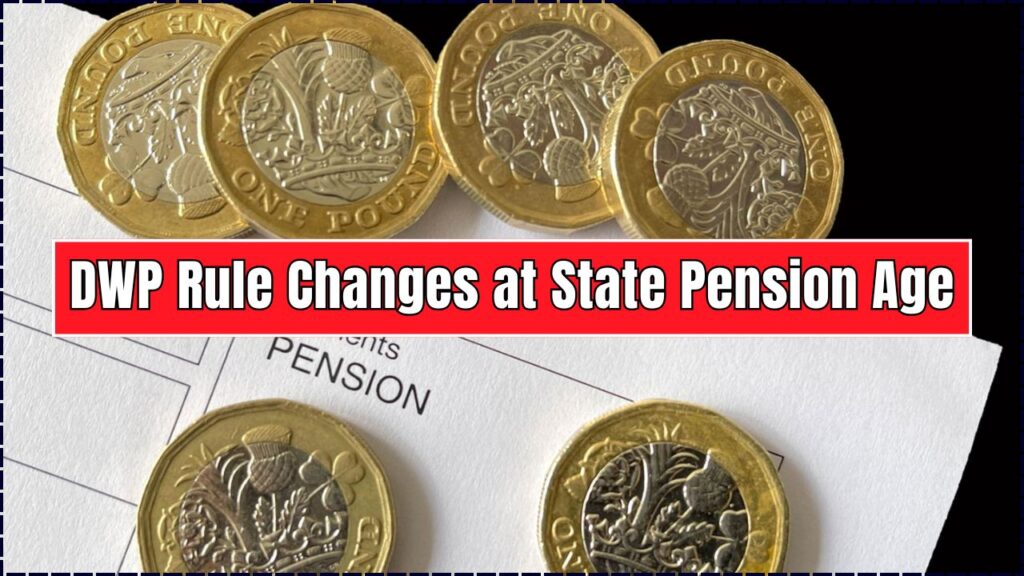When it comes to retirement, nothing gets folks more nervous than the big question: “What happens when I hit State Pension age?” The DWP (Department for Work and Pensions) rule changes at State Pension age are a game-changer. Some benefits vanish overnight, while new ones open up. Confused? Don’t worry—this guide breaks it all down: what you lose, what you gain, and what to do next.
This isn’t dry government talk—we’ll keep it real with stats, stories, and practical steps you can actually use.

DWP Rule Changes at State Pension Age
| Category | Details |
|---|---|
| State Pension Age | Currently 66, rising to 67 (2026–2028) and 68 (2044–2046) |
| What You Lose | Universal Credit, ESA, JSA stop; no new PIP claims; GMP not increased |
| What You Gain | State Pension up to £230.25/week (2025/26); Pension Credit; Winter Fuel Payment; deferral option |
| Average Pension | £11,502/year (2025/26 full rate) |
| Who Relies on It | Around 1 in 4 UK retirees depend mainly on State Pension (ONS 2024) |
| Action Steps | Check NI record, fill gaps, apply for Pension Credit, plan tax strategy |
The DWP rule changes at State Pension age are a mixed bag. You lose working-age benefits but gain the steady State Pension plus extras like Pension Credit and Winter Fuel. The trick is preparation: check your forecast, fill gaps, apply early, and plan your taxes. With smart moves, you can turn potential headaches into a secure retirement.
Why the DWP Rule Changes Matter
When you reach pension age, the ground shifts under your feet. One day you’re juggling Universal Credit or ESA, the next day those are gone—and you’re relying on the State Pension.
Here’s the kicker: For many Brits, the State Pension is their main or even only income. According to the Office for National Statistics (ONS), nearly 25% of retirees rely almost entirely on it. That makes knowing the rules critical.
What You Lose at State Pension Age
1. Working-Age Benefits Stop
Universal Credit, JSA, Income Support, and ESA all shut off once you hit pension age. If you’re still claiming, you risk overpayments.
Case Example: Sarah, 66, was on ESA. She didn’t realize it stops at pension age and kept getting payments. A year later, DWP asked her to repay £3,200.
2. No New Claims for PIP
Personal Independence Payment (PIP) can’t be claimed after pension age. Instead, you may qualify for Attendance Allowance, which covers long-term illness or disability.
3. Guaranteed Minimum Pension (GMP) Impact
For those retiring after April 2016, the GMP isn’t boosted through the State Pension. That means fewer automatic increases compared to older retirees.
Benefits at State Pension Age
| Benefit | Before State Pension Age (Under 66) | At or After State Pension Age (Currently 66+) |
| State Pension | Not eligible for a claim. | Eligible to claim, provided you have at least 10 qualifying years of National Insurance contributions. |
| Personal Independence Payment (PIP) | You can make a new claim. | You cannot make a new claim. If you are already receiving PIP, you can continue to get it, but your eligibility for the mobility element may be affected. |
| Universal Credit | Can be claimed, with work-related requirements often applied. | Generally, you move to the State Pension and other benefits like Pension Credit. |
| Pension Credit | Not eligible to claim. | You can claim to top up your income. Eligibility is tied to the State Pension age. |
What You Gain at State Pension Age
1. The State Pension
The crown jewel. In 2025/26, the full new State Pension is £230.25 per week (£11,502 a year). To get the full whack, you need 35 years of National Insurance contributions. With 10 years, you get a reduced amount.
Tip: Missing years? Buy them back. It’s one of the smartest investments you’ll ever make.
2. Pension Credit for Low Incomes
If you’re single and under £218.15 a week in income—or a couple under £332.95—you may qualify. Bonus: it unlocks Housing Benefit, Council Tax support, and a free TV licence at 75.
3. Winter Fuel and Other Perks
- Winter Fuel Payment (up to £600 in some years)
- Free NHS dental care if on Pension Credit
- Bus passes and senior discounts
4. Deferring Your Pension
If you wait, your pension grows. Every 9 weeks deferred adds 1% to your future payments. That’s 5.8% per year.
Case Example: Mike, 67, still works part-time. He defers for 3 years. His pension grows by £40 a week for life. That’s an extra £2,000 a year forever.
Historical Context—Why Rules Keep Changing
Back in the day, pension age was 65 for men and 60 for women. But with folks living longer (average life expectancy now 81 years in the UK), the government raised ages to keep the system sustainable. By 2046, pension age will hit 68.
UK vs USA—How Retirement Systems Compare
- UK: Flat-rate State Pension based on NI contributions. Top-ups via Pension Credit.
- USA: Social Security based on lifetime earnings. Full retirement age is 67, but you can claim from 62 at reduced rates. Deferral boosts payouts until 70.
Why it matters: If you’ve worked in both countries, you may qualify for benefits from each (see the US-UK Social Security Totalization Agreement).
Step-by-Step Retirement Checklist
- Check your NI record — GOV.UK tool
- Fill gaps — Buy missing years if cost-effective
- Get a pension forecast — Know your income now
- Apply for Pension Credit — up to 4 months early
- Consider tax planning — Pensions are taxable income
- Look into deferral — Only if financially safe
- Sort disability benefits — Switch PIP to Attendance Allowance if needed
- Budget smart — Track expenses, account for inflation
Top 3 Mistakes to Avoid When Approaching State Pension Age
Mistake #1: Ignoring other benefits. Just because you’re about to get your State Pension doesn’t mean you can’t get other support. Check if you are eligible for benefits like Pension Credit, Housing Benefit, or Winter Fuel Payments, as these can provide a significant boost to your income.
Mistake #2: Assuming your State Pension is automatic. You will not be paid automatically. You must actively claim your State Pension. The DWP will usually send a letter inviting you to claim about four months before you reach your pension age, but it’s your responsibility to apply.
Mistake #3: Not checking your National Insurance record. Gaps in your record could reduce your final pension amount. You can often fill these gaps by making voluntary contributions.
Real-World Case Study or Mini Example
Meet Margaret: Margaret is 65 and was born in 1960. She planned to retire on her 66th birthday, expecting her State Pension to begin. However, due to the rule changes, her State Pension age has been raised to 66 years and six months. By checking her date of birth against the official DWP calculator, she discovered she had to wait an extra six months before she could claim. This gave her time to adjust her plans, continue working part-time, and apply for Pension Credit to help with her income in the interim, ensuring she was prepared for the change.
FAQs
What age is the UK State Pension now?
It’s 66, rising to 67 between 2026–2028 and 68 by 2046.
How much is the State Pension in 2025/26?
£230.25 per week, about £11,502 a year.
Can I still get benefits after pension age?
Yes—Pension Credit, Attendance Allowance, Housing Benefit, Winter Fuel. But UC and ESA stop.
Should I defer my pension?
Yes, if you don’t need the income right away. It grows by 5.8% each year deferred.
How many people rely only on State Pension?
About 25% of retirees in the UK have little or no private savings (ONS 2024).












